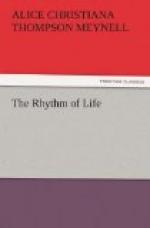Simplicity is worth the sacrifice; but all is not sacrifice. Rejection has its pleasures, the more secret the more unmeasured. When we garnish a house we refuse more furniture, and furniture more various, than might haunt the dreams of decorators. There is no limit to our rejections. And the unconsciousness of the decorators is in itself a cause of pleasure to a mind generous, forbearing, and delicate. When we dress, no fancy may count the things we will none of. When we write, what hinders that we should refrain from Style past reckoning? When we marry—. Moreover, if simplicity is no longer set in a world having the great and beautiful quality of fewness, we can provide an equally fair setting in the quality of refinement. And refinement is not to be achieved but by rejection. One who suggests to me that refinement is apt to be a mere negative has offered up a singular blunder in honour of robustiousness. Refinement is not negative, because it must be compassed by many negations. It is a thing of price as well as of value; it demands immolations, it exacts experience. No slight or easy charge, then, is committed to such of us as, having apprehension of these things, fulfil the office of exclusion. Never before was a time when derogation was always so near, a daily danger, or when the reward of resisting it was so great. The simplicity of literature, more sensitive, more threatened, and more important than other simplicities, needs a guard of honour, who shall never relax the good will nor lose the good heart of their intolerance.
THE LESSON OF LANDSCAPE
The landscape, like our literature, is apt to grow and to get itself formed under too luxurious ideals. This is the evil work of that little more which makes its insensible but persistent additions to styles, to the arts, to the ornaments of life—to nature, when unluckily man becomes too explicitly conscious of her beauty, and too deliberate in his arrangement of it. The landscape has need of moderation, of that fast-disappearing grace of unconsciousness, and, in short, of a return towards the ascetic temper. The English way of landowning, above all, has made for luxury. Naturally the country is fat. The trees are thick and round—a world of leaves; the hills are round; the forms are all blunt; and the grass is so deep as to have almost the effect of snow in smoothing off all points and curving




